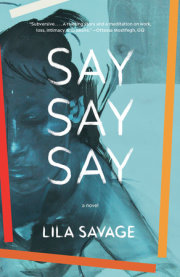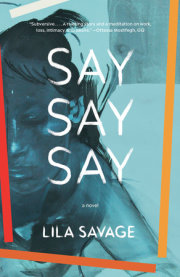1 Later, looking back, Ella would be hard pressed to remember any details that had set this interview apart. It was sad, but then it was always sad, or Ella wouldn’t be needed. She had been working as a companion for elderly people for six years, and somewhere along the way, sadness had lost its power to shock Ella the way it once had. It still reached her, but it was like recognizing a flavor, like eating a jelly bean without looking first to see what color it was.
Oh this, she might think,
I know this taste. This is incremental loss. This is trying to remember. This is regret. This is forgetting, forgotten, gone. This flavor is grief.
Jill was different from most of Ella’s other clients: she was young, only sixty, the victim of an accident rather than the mental and physical crush of age. The tragedy of such premature loss was unfamiliar to Ella, but she stepped up to it dutifully, felt for its contours, pressed the tip of her tongue to its bitterness, and, ultimately, shouldered its weight. What was her burden compared to Jill’s? Compared to those who loved her?
She had liked them, immediately and more than usual. She felt they might have been friends,
ordinary friends, were the circumstances ordinary, which, of course, they weren’t. Nick, Jill’s son, was only a few years older than Ella, and he had an endearing sincerity to him, not earnestness but an unusual frankness, as though he couldn’t be bothered to dilute his humor or irritation or sadness into the tepid, circumspect conversation of most people. His father, Bryn, had an easy charm about him, and only his increasing talkativeness as he warmed up to Ella betrayed how isolating his circumstances must be. They had been dealing with the aftermath of Jill’s car accident and head injury for more than a decade now. Jill had seemed mostly herself for a while, but then came the crying, and the tantrums that seemed out of all proportion, and now she was sometimes like an advanced Alzheimer’s patient, mumbling semi-coherently, wandering around, requiring near-constant supervision. Bryn had retired three years earlier to care for her, and her needs had only grown since then. Nick helped as much as he could, usually on weekends, but he and his wife lived up in Hinckley and couldn’t realistically drive into Minneapolis more than once a week.
They had gathered in the living room for the interview, with Ella a lonely figure on the puffy leather couch and the two men standing, as though resting might betray how weary they truly were.
“I hope this doesn’t sound creepy,” Nick said, “but once I learned your full name I checked to see if we have any Facebook friends in common. You know Trent Olson?” She nodded and he smiled with real friendliness, although there was a restlessness to his bearing that had probably read as hyperactivity when he was a child and, now that he was in his thirties, looked more like athleticism, maybe. But though his was the kind of masculinity that held little appeal for Ella, she watched for cues he might be flirting with her.
Nick excused himself to go check on Jill, leaving Bryn and Ella to themselves. Bryn seemed pleased that he would have more time to explore interests outside of caregiving, and also pleased that he had someone to discuss it with.
“We’re too deep into spring to do everything I want in the garden,” Bryn said, “but soon there will be tons of green beans to pick, and raspberries, and zucchini, and then we’ll really get into tomato season. Jill used to be able to help with the harvesting but not anymore. I could occupy her for nearly an hour at a time picking raspberries on a nice day, until eventually she began to see it as a chore, and then she could no longer do it anyway.” He relayed these stages of decline with what seemed an easy candor.
“Do you grow any rhubarb?” Ella asked.
“Not really on purpose, but there’s some that keeps stubbornly coming up on the side of the house.”
“I like to make chilled sweet rhubarb soup, it’s so summery. But I live in an apartment now so I can’t grow my own and it seems wrong to buy rhubarb in a grocery store.”
“I know what you mean. When Nick was small, he would take a juice glass of sugar out to the rhubarb patch and break stems off to dip and eat. It’s not a grocery-store kind of food.”
Again Ella checked to see how this nostalgia registered on Bryn’s face and found that his eyes were smiling with an uncomplicated cheerfulness that matched his grin.
“I’d like to sign up for a Community Ed class or two also,” Bryn said. “Since I retired to take care of Jill, I haven’t kept pace with the latest technology for carpentry.”
As he described the dimensional capabilities of computer programs for woodworking, Ella decided they
would become friends. A more sentimental or less experienced caregiver might have assumed that this didn’t require deciding, but Ella had done some version of this many times with others, and had learned early on the benefits of some degree of detachment. Ella usually found clients through her Craigslist ad, and sometimes through word of mouth, because an agency would take too large a cut and would require her to have a car. Her first client had been her friend Jake’s grandmother, whom she had known and cared about before the fog descended; Ella had been job hunting after dropping out of graduate school when Jake’s mom had asked, “Could you visit my mother a few days a week?” At first Ella had been shocked that she could earn even a meager living this way (fifteen dollars an hour to start, twenty after the first year), just listening to Betty’s meandering stories, making sandwiches, playing checkers, feeding the ducks. With Betty, Ella had remained wide open; as the weeks and months progressed, the air between the two women had become charged like metal or water conducting electricity, the pangs of loss and death intermittent but shocking. If Betty didn’t answer the door of her senior apartment, Ella would feel panic swell in her throat; her body would prepare itself for impact as she scurried to find some staff member with a master key. Each time, Betty would have been napping, or getting her hair done in the basement of the building, or using the bathroom, and Ella would cry with relief, shaken and grateful, like the mother of a child who has stopped one step away from the path of a speeding bus. This was not a sustainable response, not for all the workdays in a week, all the weeks in a year, six years, half a dozen clients and counting.
And so Ella had learned to step in and out of grief, to sample it on demand. She didn’t seek to block it out entirely because the poignancy was among the few rewards of the job. It was a strange way to make a living: the slow creep of hours, the tedium of domesticity and isolation, morning talk shows bleeding into drowsy afternoon soaps, all pierced with looming mortality and surreal delusions. She would succumb to the boredom and drift, as though submerged in a lake. The cool water would tug her gently; sounds were muffled, it was tranquil, and then something would compel her to burst through the surface and confront the frailty and sorrow and humiliation of decline. For a moment, she would be fully present in this sadness, porous in her empathy. It was almost unbearable, but at the same time, it seemed like a gift, to feel so much. She began to feel, rather than know, that the promise of death infused the adrenaline of living, and she was grateful to have this lesson at so little personal cost, because the tragedy belonged to someone who’d begun as a stranger.
Ella alternated between certainty that her true talents were wasted in this unskilled service work and another kind of certainty, that each action she took mattered, whether it was changing a soiled disposable brief with kindness and tact or listening to a tedious reminiscence for the thousandth time, so that someone whose self was slipping from them might clutch it for a moment longer. The truth contained both of these elements but was far more complicated. Ella had other talents, though perhaps none were greater than these; what were her elaborate meals or mediocre paintings to anyone but her? And if this caregiving, this tact and empathy, represented the best she had to offer, then it was also true that she offered these gifts as infrequently as she wrote her occasional poem. More often than not, she browsed through a magazine, she microwaved a hot dog, she did laundry just for an excuse to leave the room, she drifted in her mental lake as her client dozed—it all hinged upon her whim. And then there was this other nagging concern: the way her role often felt uncomfortably voyeuristic—she could hold it all at arm’s length, even if only for a while.
Nick came back into the room and said, with a laugh but also a degree of the derision grown sons are inclined to display toward their fathers, “Dad, stop boring Ella. I’m sure she has places to be.” It wasn’t that Bryn was being inappropriate; it was more like Nick saw the tang of his father’s loneliness as a reflection on him. Although Bryn remained smiling, his voice took on an edge as he responded to Nick. “We’re just getting acquainted,” he said.
“Oh, before you go, would you like to meet my mom?” Nick asked, turning toward Ella in a way that seemed to subtly exclude Bryn.
“Of course,” Ella said, making eye contact with Bryn as though it were his question she was answering. The three of them followed the sound of a television down a dim hallway and into a small den. Ella expected Jill to be sitting, but she stood with her back partially turned away from the television and a naked plastic baby doll in her hands. Jill looked so much younger than Ella expected that it startled her, momentarily, out of her detached professionalism. Jill was slim, and there was no gray in her curly red hair. Her freckled face was nearly unlined except for the deepening channels that ran from the sides of her nose to the corners of her mouth, and the reading glasses perched on her delicately pointed nose suggested that she had perhaps just set down an interesting magazine article to perform her role as hostess.
“Hello,” Ella said. “So nice to meet you. What a pleasant room.” She turned as though admiring it, took in the windows illuminated by afternoon sun and the old, dark-stained built-in bookshelf. Eventually she would come to have each title and trinket it contained memorized, but today she turned back to Jill to see how her greeting was being received. Jill seemed agitated, although it was difficult to tell if this was in response to the newly crowded room. She muttered something beneath her breath; Ella couldn’t tell if it was addressed to her or to the doll. Bryn stepped closer to Jill and put an arm around her, squeezing her into a brief side hug. Ella observed that they seemed at once just like a long-married couple in that moment of casual affection and entirely unlike one in the clear disparity between their capacities.
“Say say say,” Jill said, and then she crooned lovingly to the doll, ran a dirty-nailed finger down the doll’s plump cheek.
Copyright © 2019 by Lila Savage. All rights reserved. No part of this excerpt may be reproduced or reprinted without permission in writing from the publisher.








